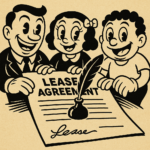Let’s be honest — life doesn’t always follow your lease term. Maybe you got a new job in another state, your relationship changed, or you simply can’t afford your rental unit anymore. Whatever the reason, you might be wondering about breaking a lease in other states like North Carolina without damaging your credit, losing your security deposit, or ending up in housing court?
The good news: Yes, you can.
The better news? We’ll show you how to do it the right way.
Understanding Your Lease Agreement First

Read the Fine Print
Before anything else, pull out your lease agreement. This document outlines your rights and responsibilities, including:
Whether you can break the lease early
If there’s a penalty fee
Rules around subletting or lease assignment
The amount of notice you’re required to give
Understanding your rental agreement helps you avoid surprises later on.
What Does It Mean to Break a Lease in New York?
A Lease Is a Legal Contract
Breaking a lease means ending your NYC apartment lease before the agreed lease term is over. It’s technically a breach of contract, which means there can be financial or legal consequences — unless you follow the proper steps or have a legally justified reason.
Common Reasons Tenants Need to Leave Early

Life happens. Tenants may break a lease due to:
Job relocation or new opportunities
Financial hardship
Unsafe living conditions
Health issues or accessibility needs
Relationship changes
Moving into senior citizen housing
Military duty or active military service
Personal emergencies
Legal Reasons to Break a Lease Without Penalty
Some situations allow you to legally walk away from your lease:
1. Domestic Violence Protection
Under New York law, survivors of domestic violence can terminate their lease early without penalty. You must provide written notice and documentation, such as a restraining order or police report.
2. Active Military Duty
The Civil Relief Act protects service members who are deployed or relocated. If you’re called into active military duty, you can legally break your lease.
3. Uninhabitable Conditions
If your rental property becomes unsafe or violates housing codes — like having no heat, mold, or pests — you may be constructively evicted. This gives you the legal right to leave.
4. Senior Housing or Medical Needs
Older tenants can break a lease to move into a residential facility or if they can no longer live independently due to medical reasons.
Step-by-Step: How to Break a Lease in NYC the Right Way
Step 1: Review the Lease for Early Exit Options
Look for clauses that outline:
An early termination fee
The need for a replacement tenant
Rules about re-rent efforts or lease assignment
Some leases even allow a clean break for a flat fee — a common solution offered by most landlords to simplify the process.
Step 2: Give Proper Notice in Writing
Even if you’re leaving for a valid reason, always give advance notice — and make sure it’s a written notice. Include:
Your name and apartment address
Your intended move-out date
Reason for terminating the lease
A request for the return of your security deposit
Providing proper notice is key to avoiding disputes later.
Step 3: Talk to Your Landlord
Open communication helps. Many New York landlords are willing to work with tenants — especially if you offer:
A new tenant to take over
To help show the apartment to prospective tenants
An early lease break fee
A mutual lease termination agreement
Be respectful, keep it professional, and document every interaction.
Step 4: Help Find a Replacement Tenant
Landlords must make reasonable efforts to re-rent the unit. But you can help:
List the apartment on rental sites
Screen candidates for your landlord’s review
Ensure the incoming tenant is qualified
According to New York landlord tenant law, landlords can’t just leave the apartment empty and charge you for the full remaining rent — they have to try to re-rent it.
Step 5: Clean and Document the Property
Leave the unit in good condition. Take photos or videos to document:
The cleanliness of the apartment
Any damage you didn’t cause
The return of keys, fobs, or parking passes
This protects your security deposit and helps resolve disputes.
What If the Landlord Is Unreasonable?

Your Rights as a Tenant
If your landlord repeatedly violates your privacy or refuses to accept reasonable terms, you can:
Contact a landlord tenant attorney
File a complaint with local housing authorities
Present your case in small claims court
Tenants have rights, and york law requires landlords to act fairly — even if you’re leaving early.
Avoiding Common Pitfalls When Breaking a Lease
1. Leaving Without Notice
This could make you liable for:
Ongoing paying rent
Losing your security deposit
Legal action from your landlord
2. Not Documenting the Unit’s Condition
Without proof, landlords may claim damage and withhold funds unfairly.
3. Assuming the Landlord Will Re-Rent Immediately
Even though New York landlords must mitigate damages, they aren’t required to drop everything and find a replacement tenant the next day.
When Breaking the Lease Might Still Cost You
Even if you do everything right, you might:
Pay for a few weeks of remaining rent
Lose a small portion of your security deposit
Cover minor re-rent costs or fees
But it’s far better than ghosting your lease and risking bigger issues.
Can I Break My Lease If I Just Find a Better Apartment?
Technically, No — But…
Wanting a better view or newer building isn’t a legally justified reason. That said, many tenants:
Negotiate directly with the landlord
Offer to cover early termination fees
Propose a new lease structure
Landlords may agree to part ways if it’s in everyone’s best interest — especially in competitive rental markets.
Will This Hurt My Credit?
It can — but it doesn’t have to.
If you skip rent or leave without notice, your landlord might report the debt or take you to housing court. But if you:
Communicate clearly
Follow your lease terms
Document everything
You’ll likely walk away without a hit to your credit score.
What to Do If You’re Already Out and Owe Money
Mitigating Damages
You may still owe some remaining rent, but remember — your landlord has to make reasonable efforts to re-rent the space. If they don’t, that could lower what you’re responsible for.
Consulting with a landlord tenant attorney can help determine if your landlord is acting fairly.
Alternatives to Breaking the Lease
Lease Assignment: Transfer your lease to another qualified tenant.
Subletting: Rent it out temporarily (check if it’s allowed).
Negotiated Termination: Offer to pay 1–2 months of rent to exit peacefully.
Final Thoughts: Break the Lease — the Smart Way
Breaking a lease in NYC doesn’t have to be a legal mess. If you:
✅ Read your lease agreement
✅ Understand your tenant rights
✅ Communicate and provide written notice
✅ Offer to help mitigate damages
Then you’re doing it the smart way.
Whether you’re moving for love, work, or your own peace of mind, there’s a responsible, legal way to move on from your lease in New York.
Dave is a seasoned real estate investor with over 12 years of experience in the industry. Specializing in single-family residential real estate, David’s strategic approach combines market analysis, financial acumen, and a deep understanding of urban development trends to maximize investment returns.









